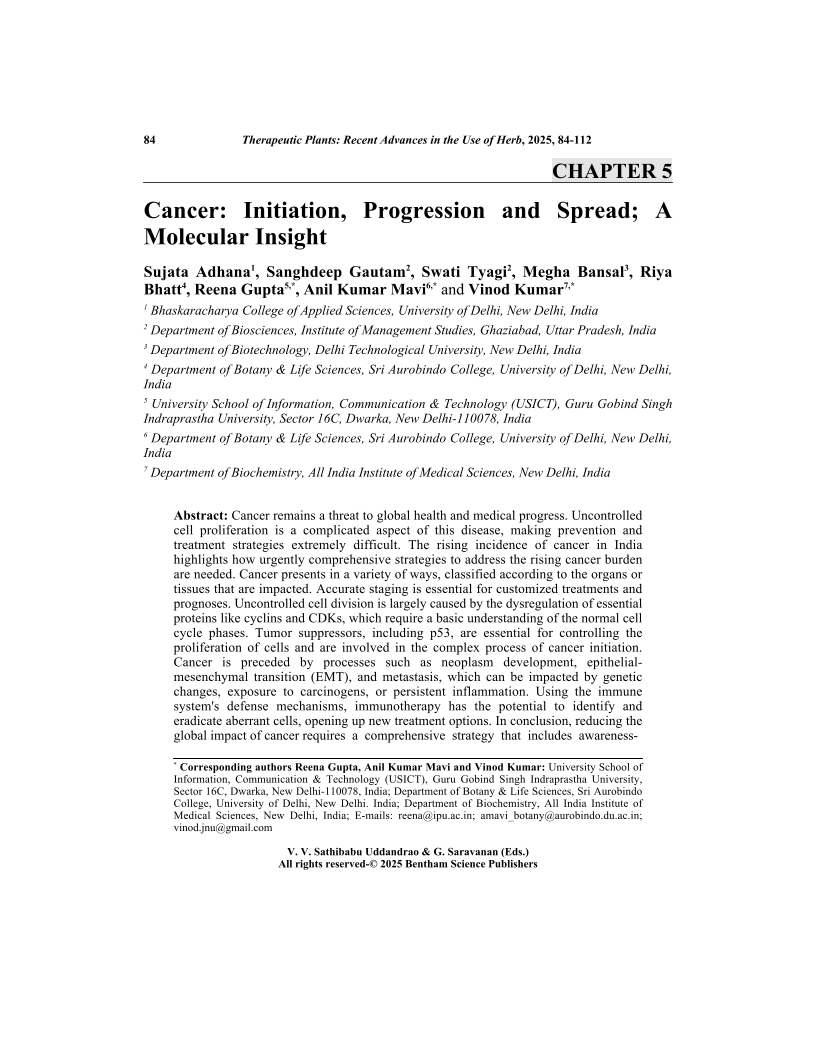Cancer: Initiation, Progression and Spread; A Molecular Insight

- Authors: Sujata Adhana1, Sanghdeep Gautam2, Swati Tyagi3, Megha Bansal4, Riya Bhatt5, Reena Gupta6, Anil Kumar Mavi7, Vinod Kumar8
-
View Affiliations Hide Affiliations1 Bhaskaracharya College of Applied Sciences, University of Delhi, New Delhi, India 2 Department of Biosciences, Institute of Management Studies, Ghaziabad, Uttar Pradesh, India 3 Department of Biosciences, Institute of Management Studies, Ghaziabad, Uttar Pradesh, India 4 Department of Biotechnology, Delhi Technological University, New Delhi, India 5 Department of Botany & Life Sciences, Sri Aurobindo College, University of Delhi, New Delhi, India 6 University School of Information, Communication & Technology (USICT), Guru Gobind Singh Indraprastha University, Sector 16C, Dwarka, New Delhi 110078, India 7 Department of Botany & Life Sciences, Sri Aurobindo College, University of Delhi, New Delhi, India 8 Department of Biochemistry, All India Institute of Medical Sciences, New Delhi, India
- Source: Therapeutic Plants: Recent Advances in the Use of Herbs as Alternative Medications , pp 84-112
- Publication Date: May 2025
- Language: English
Cancer: Initiation, Progression and Spread; A Molecular Insight, Page 1 of 1
< Previous page | Next page > /docserver/preview/fulltext/9789815322910/chapter-5-1.gif
Cancer remains a threat to global health and medical progress. Uncontrolled cell proliferation is a complicated aspect of this disease, making prevention and treatment strategies extremely difficult. The rising incidence of cancer in India highlights how urgently comprehensive strategies to address the rising cancer burden are needed. Cancer presents in a variety of ways, classified according to the organs or tissues that are impacted. Accurate staging is essential for customized treatments and prognoses. Uncontrolled cell division is largely caused by the dysregulation of essential proteins like cyclins and CDKs, which require a basic understanding of the normal cell cycle phases. Tumor suppressors, including p53, are essential for controlling the proliferation of cells and are involved in the complex process of cancer initiation. Cancer is preceded by processes such as neoplasm development, epithelialmesenchymal transition (EMT), and metastasis, which can be impacted by genetic changes, exposure to carcinogens, or persistent inflammation. Using the immune system's defense mechanisms, immunotherapy has the potential to identify and eradicate aberrant cells, opening up new treatment options. In conclusion, reducing the global impact of cancer requires a comprehensive strategy that includes awareness raising, prevention, early detection, and cutting-edge treatments. Future cancer treatments could be more precise and effective thanks to ongoing research, especially in immunotherapy.
-
From This Site
/content/books/9789815322910.chapter-5dcterms_subject,pub_keyword-contentType:Journal -contentType:Figure -contentType:Table -contentType:SupplementaryData105

